marine pollution海洋污染 英文版
海水污染英语作文120词
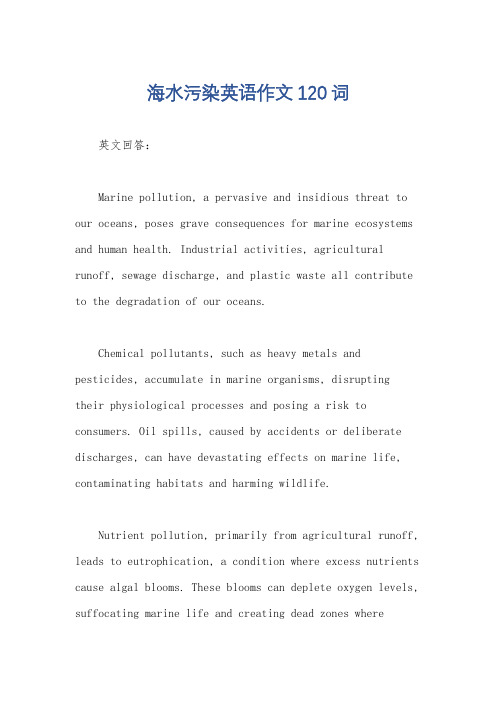
海水污染英语作文120词英文回答:Marine pollution, a pervasive and insidious threat to our oceans, poses grave consequences for marine ecosystems and human health. Industrial activities, agricultural runoff, sewage discharge, and plastic waste all contribute to the degradation of our oceans.Chemical pollutants, such as heavy metals and pesticides, accumulate in marine organisms, disruptingtheir physiological processes and posing a risk to consumers. Oil spills, caused by accidents or deliberate discharges, can have devastating effects on marine life, contaminating habitats and harming wildlife.Nutrient pollution, primarily from agricultural runoff, leads to eutrophication, a condition where excess nutrients cause algal blooms. These blooms can deplete oxygen levels, suffocating marine life and creating dead zones whereaquatic organisms cannot survive.Plastic pollution is perhaps the most visible and widespread form of marine pollution. Plastic debris entangles marine animals, harms their digestive systems,and accumulates in the food chain. Microplastics, tiny pieces of plastic, are even being found in marine organisms at the base of the food chain.Marine pollution poses significant risks to human health. Consumption of contaminated seafood can lead to poisoning and health issues. Harmful algal blooms can produce toxins that threaten the health of shellfish consumers and those who swim in polluted waters.Addressing marine pollution requires a comprehensive approach involving governments, industries, and individuals. Reducing industrial emissions, improving agricultural practices, and implementing effective waste management systems are crucial steps towards mitigating this problem.中文回答:海水污染。
海洋污染 英语作文
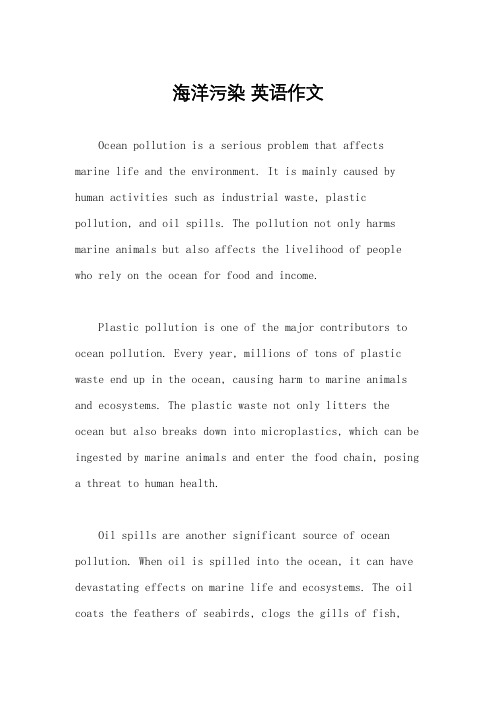
海洋污染英语作文Ocean pollution is a serious problem that affects marine life and the environment. It is mainly caused by human activities such as industrial waste, plastic pollution, and oil spills. The pollution not only harms marine animals but also affects the livelihood of people who rely on the ocean for food and income.Plastic pollution is one of the major contributors to ocean pollution. Every year, millions of tons of plastic waste end up in the ocean, causing harm to marine animals and ecosystems. The plastic waste not only litters the ocean but also breaks down into microplastics, which can be ingested by marine animals and enter the food chain, posing a threat to human health.Oil spills are another significant source of ocean pollution. When oil is spilled into the ocean, it can have devastating effects on marine life and ecosystems. The oil coats the feathers of seabirds, clogs the gills of fish,and smothers the habitats of marine animals. It can take years for the ecosystem to recover from an oil spill, and some effects may be irreversible.Industrial waste, including chemicals and heavy metals, also contributes to ocean pollution. These pollutants can contaminate the water and harm marine life. They can also accumulate in the tissues of marine animals, posing a riskto human health when consumed.The impact of ocean pollution is far-reaching and requires immediate action to address. Governments, industries, and individuals all have a role to play in reducing ocean pollution. Efforts to reduce plastic waste, improve waste management, and enforce regulations on industrial waste disposal are crucial steps in combating ocean pollution.In conclusion, ocean pollution is a pressing issue that requires collective action to address. By raising awareness, implementing regulations, and changing our consumptionhabits, we can work towards a cleaner and healthier ocean for future generations.。
海洋污染的英文作文
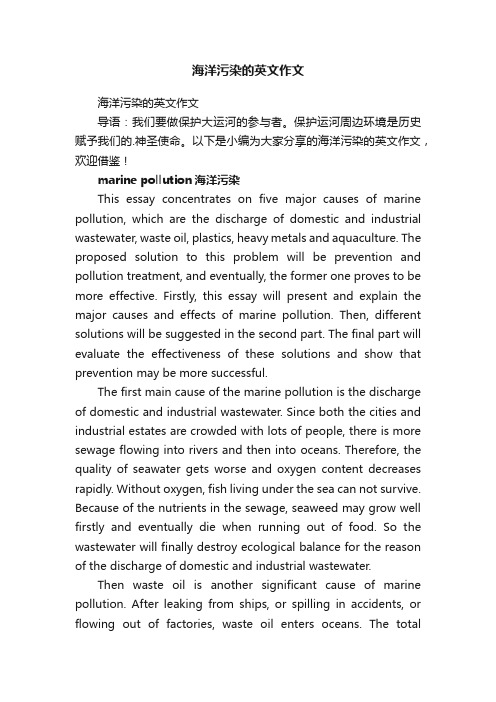
海洋污染的英文作文海洋污染的英文作文导语:我们要做保护大运河的参与者。
保护运河周边环境是历史赋予我们的.神圣使命。
以下是小编为大家分享的海洋污染的英文作文,欢迎借鉴!marine pollution海洋污染This essay concentrates on five major causes of marine pollution, which are the discharge of domestic and industrial wastewater, waste oil, plastics, heavy metals and aquaculture. The proposed solution to this problem will be prevention and pollution treatment, and eventually, the former one proves to be more effective. Firstly, this essay will present and explain the major causes and effects of marine pollution. Then, different solutions will be suggested in the second part. The final part will evaluate the effectiveness of these solutions and show that prevention may be more successful.The first main cause of the marine pollution is the discharge of domestic and industrial wastewater. Since both the cities and industrial estates are crowded with lots of people, there is more sewage flowing into rivers and then into oceans. Therefore, the quality of seawater gets worse and oxygen content decreases rapidly. Without oxygen, fish living under the sea can not survive. Because of the nutrients in the sewage, seaweed may grow well firstly and eventually die when running out of food. So the wastewater will finally destroy ecological balance for the reason of the discharge of domestic and industrial wastewater.Then waste oil is another significant cause of marine pollution. After leaking from ships, or spilling in accidents, or flowing out of factories, waste oil enters oceans. The totalamount of waste oil is surprisingly great. Then the waste oil floats on the water and drifts with winds for it is lighter than water. Several elements in the waste oil are harmful to the living of creatures, especially to the living of seabirds. The oil sticks to the wings of seabirds so they can not fly and die on the sea one after another. It is also poisonous for fish and sea plants. So it is obvious that waste oil may letmany creatures to run into danger of dying out.The third major cause of marine pollution is plastics. Plastics are the main solid pollutants and people treat the oceans like a giant dustbin to pour plastics in. Kusui and Noda’s research showed that in the seashore of Japan, if there are 100 waste items thrown by people, 73 items are plastics, and the plastic litter equals 53.8% of the total litter of wastes. In the neighbouring Russia, the statistics are 55 items and 23.4% respectively (Islam, 2004).[1] The plastics can block the propeller of ships, and may cause enormous accident. Plastics floating in the oceans can also cause lack of oxygen and have the similar effects, preventing respiration of creatures, as the sewage does. When the plastics break down in the oceans, they can be toxic to marine plants and animals. Therefore, plastics are not only harmful to ships sailing in the oceans and mankind, but also to other creatures living in the seas.Heavy metals are the fourth main cause of the environment problem. There are various sorts of heavy metals contained in water from factories. They go into the oceans through rivers or water run-off. Then they are eaten by fish and begin to accumulate in their bodies. When these fish are caught by us human beings, heavy metals enter our bodies and make us ill. Heavy metals can cause serious diseases.Aquaculture is the final major cause to marine pollution. People usually cultivate fish and other marine life for food. But the foods which they use to feed marine life consequently harm the marine environment where there are people live around. It is because these foods are organic matter and will become rotten in the oceans gradually. The quality of seawater is reduced by this kind of substance and the marine life livingin this ocean area and adjacent ocean area will die. Thus, aquaculture will cause harm to the quality of seawater of large areas of oceans.There are two main solutions to the marine pollution problem. Prevention comes out first. It is suggested that governments should perfect new intendance system of protecting the quality of water that we should make water completely clean before it is discharged to the oceans. It is also necessary to establish laws to keep the conduct of people and enterprises, and develop cooperation among different countries. The second main solution is pollution treatment, which contains setting up treatment plants and planting trees. In Kocasoy, Mutlu, and Alag?z’s study (2008), [2] these solutions can reduce the discharge of domestic and industrial wastewater as well as improve the quality of seawater. Since trees are able to make soil secure and hold back water from running off, they can be planted in the crowded cities and factories which cause marine pollution. Treatment plants are used to cleanse the seawater.Considering the advantages and disadvantages of the two solutions, prevention of marine pollution will be more effective to solve the problem. In one hand, prevention is the most essential theme of environmental management. The monitoring of water quality can be put into practice in advance to preventdamage to ocean environment. To improve attitudes of people and enterprises towards pollution will obviously be helpful and it is feasible to bringing these limits to maintain the marine environment in good condition. In the other hand, always firstly polluting the marine environment and then taking counter-measures as treatment is irresponsible behaviour. Although these measures can reduce pollution to some extent, the disastrous consequences may have already existed, and marine pollution will continually come into being and never end. Consequently, prevention is much better in solving the pollution problem.This essay considers the main causes and effects of marine pollution. The five causes are the discharge of domestic and industrial wastewater, waste oil, plastics, heavy metals and aquaculture. They can destroy the ecological balance, endanger many creatures of dying out, harm ships, human beings and other creatures, cause serious diseases to mankind, and cause harm to the quality of seawater of large areas of oceans. The solutions are prevention and pollution treatment. The prevention of marine pollution is proved to be more effective than pollution treatment because it can basically solve this problem and maintain the marine environment in a good condition. In my opinion, it is a challenge for governments to take proper measures to prevent people continuing polluting behaviour. However, there is still a long way to go in the future.。
海洋污染的英文精选作文
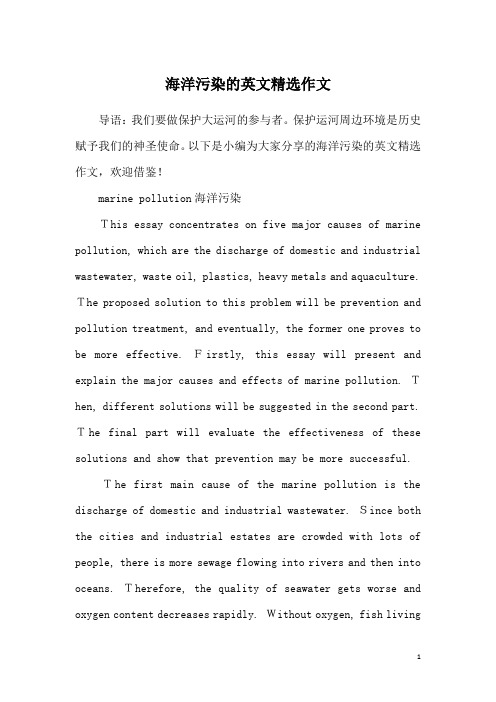
海洋污染的英文精选作文导语:我们要做保护大运河的参与者。
保护运河周边环境是历史赋予我们的神圣使命。
以下是小编为大家分享的海洋污染的英文精选作文,欢迎借鉴!marine pollution海洋污染This essay concentrates on five major causes of marine pollution, which are the discharge of domestic and industrial wastewater, waste oil, plastics, heavy metals and aquaculture. The proposed solution to this problem will be prevention and pollution treatment, and eventually, the former one proves to be more effective. Firstly, this essay will present and explain the major causes and effects of marine pollution. Then, different solutions will be suggested in the second part. The final part will evaluate the effectiveness of these solutions and show that prevention may be more successful.The first main cause of the marine pollution is the discharge of domestic and industrial wastewater. Since both the cities and industrial estates are crowded with lots of people, there is more sewage flowing into rivers and then into oceans. Therefore, the quality of seawater gets worse and oxygen content decreases rapidly. Without oxygen, fish livingunder the sea can not survive. Because of the nutrients in the sewage, seaweed may grow well firstly and eventually die when running out of food. So the wastewater will finally destroy ecological balance for the reason of the discharge of domestic and industrial wastewater.Then waste oil is another significant cause of marine pollution. After leaking from ships, or spilling in accidents, or flowing out of factories, waste oil enters oceans. The total amount of waste oil is surprisingly great. Then the waste oil floats on the water and drifts with winds for it is lighter than water. Several elements in the waste oil are harmful to the living of creatures, especially to the living of seabirds. The oil sticks to the wings of seabirds so they can not fly and die on the sea one after another. It is also poisonous for fish and sea plants. So it is obvious that waste oil may letmany creatures to run into danger of dying out.The third major cause of marine pollution is plastics. Plastics are the main solid pollutants and people treat the oceans like a giant dustbin to pour plastics in. Kusui and Noda’s research showed that in the seashore of Japan, if there are 100 waste items thrown by people, 73 items are plastics,and the plastic litter equals 53.8% of the total litter of wastes. In the neighbouring Russia, the statistics are 55 items and 23.4% respectively (Islam, 20XX).[1] The plastics can block the propeller of ships, and may cause enormous accident. Plastics floating in the oceans can also cause lack of oxygen and have the similar effects, preventing respiration of creatures, as the sewage does. When the plastics break down in the oceans, they can be toxic to marine plants and animals. Therefore, plastics are not only harmful to ships sailing in the oceans and mankind, but also to other creatures living in the seas.Heavy metals are the fourth main cause of the environment problem. There are various sorts of heavy metals contained in water from factories. They go into the oceans through rivers or water run-off. Then they are eaten by fish and begin to accumulate in their bodies. When these fish are caught by us human beings, heavy metals enter our bodies and make us ill. Heavy metals can cause serious diseases.Aquaculture is the final major cause to marine pollution. People usually cultivate fish and other marine life for food. But the foods which they use to feed marine life consequently harm the marine environment where there are people live around.It is because these foods are organic matter and will become rotten in the oceans gradually. The quality of seawater is reduced by this kind of substance and the marine life living in this ocean area and adjacent ocean area will die. Thus, aquaculture will cause harm to the quality of seawater of large areas of oceans.There are two main solutions to the marine pollution problem. Prevention comes out first. It is suggested that governments should perfect new intendance system of protecting the quality of water that we should make water completely clean before it is discharged to the oceans. It is also necessary to establish laws to keep the conduct of people and enterprises, and develop cooperation among different countries. The second main solution is pollution treatment, which contains setting up treatment plants and planting trees. In Kocasoy, Mutlu, and Alag?z’s study (20XX), [2] these solutions can reduce the discharge of domestic and industrial wastewater as well as improve the quality of seawater. Since trees are able to make soil secure and hold back water from running off, they can be planted in the crowded cities and factories which cause marine pollution. Treatment plants are used to cleanse the seawater.Considering the advantages and disadvantages of the twosolutions, prevention of marine pollution will be more effective to solve the problem. In one hand, prevention is the most essential theme of environmental management. The monitoring of water quality can be put into practice in advance to prevent damage to ocean environment. To improve attitudes of people and enterprises towards pollution will obviously be helpful and it is feasible to bringing these limits to maintain the marine environment in good condition. In the other hand, always firstly polluting the marine environment and then taking counter-measures as treatment is irresponsible behaviour. Although these measures can reduce pollution to some extent, the disastrousconsequences may have already existed, and marine pollution will continually come into being and never end. Consequently, prevention is much better in solving the pollution problem.This essay considers the main causes and effects of marine pollution. The five causes are the discharge of domestic and industrial wastewater, waste oil, plastics, heavy metals and aquaculture. They can destroy the ecological balance, endanger many creatures of dying out, harm ships, human beings and other creatures, cause serious diseases to mankind, andcause harm to the quality of seawater of large areas of oceans. The solutions are prevention and pollution treatment. The prevention of marine pollution is proved to be more effective than pollution treatment because it can basically solve this problem and maintain the marine environment in a good condition. In my opinion, it is a challenge for governments to take proper measures to prevent people continuing polluting behaviour. However, there is still a long way to go in the future.。
高一英语作文海洋污染
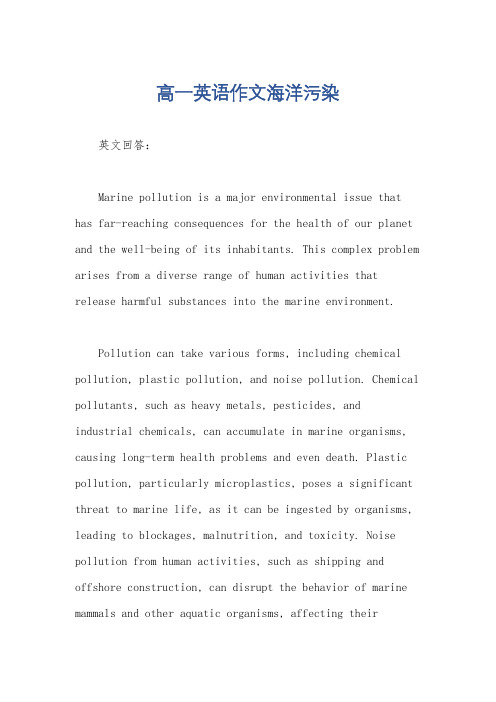
高一英语作文海洋污染英文回答:Marine pollution is a major environmental issue that has far-reaching consequences for the health of our planet and the well-being of its inhabitants. This complex problem arises from a diverse range of human activities that release harmful substances into the marine environment.Pollution can take various forms, including chemical pollution, plastic pollution, and noise pollution. Chemical pollutants, such as heavy metals, pesticides, andindustrial chemicals, can accumulate in marine organisms, causing long-term health problems and even death. Plastic pollution, particularly microplastics, poses a significant threat to marine life, as it can be ingested by organisms, leading to blockages, malnutrition, and toxicity. Noise pollution from human activities, such as shipping and offshore construction, can disrupt the behavior of marine mammals and other aquatic organisms, affecting theircommunication, reproduction, and survival.The impacts of marine pollution are far-reaching and extend beyond individual organisms. Polluted marine environments can lead to declines in biodiversity, damage to marine ecosystems, and loss of habitat. The accumulation of toxins in the food chain poses risks to human health. Furthermore, marine pollution can impact coastal economies, particularly those reliant on fisheries and tourism, and it can also decrease the aesthetic value of coastal areas.Addressing marine pollution requires a multifaceted approach that involves international cooperation, strict regulations, and public awareness campaigns. Governments must implement and enforce strict regulations to control pollution from industrial, agricultural, and shipping activities. International agreements, such as the United Nations' Sustainable Development Goal 14, which aims to conserve and sustainably use the oceans, are crucial for coordinating efforts on a global scale.Raising public awareness is vital in fostering societalchange and promoting responsible behavior. Education campaigns can inform individuals about the sources and impacts of marine pollution and empower them to make sustainable choices in their daily lives. Reducing single-use plastics, adopting eco-friendly cleaning practices, and advocating for responsible waste management are some of the ways individuals can contribute to mitigating marine pollution.By implementing comprehensive solutions and fostering collective action, we can protect our oceans from further degradation and ensure the well-being of marine life and future generations.中文回答:海洋污染。
海洋污染英语作文
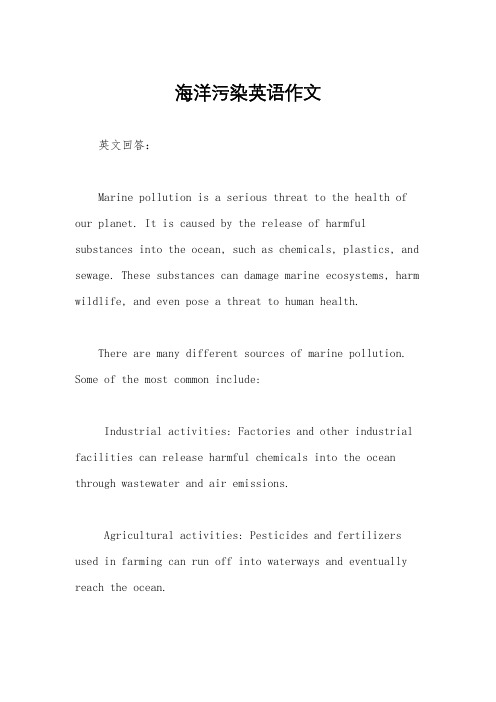
海洋污染英语作文英文回答:Marine pollution is a serious threat to the health of our planet. It is caused by the release of harmful substances into the ocean, such as chemicals, plastics, and sewage. These substances can damage marine ecosystems, harm wildlife, and even pose a threat to human health.There are many different sources of marine pollution. Some of the most common include:Industrial activities: Factories and other industrial facilities can release harmful chemicals into the ocean through wastewater and air emissions.Agricultural activities: Pesticides and fertilizers used in farming can run off into waterways and eventually reach the ocean.Sewage and wastewater: Untreated sewage and wastewater can contain harmful bacteria and viruses that can contaminate the ocean and cause disease.Plastic pollution: Plastic is a major problem for marine pollution. It can entangle wildlife, block digestive tracts, and leach harmful chemicals into the water.Oil spills: Oil spills can release large amounts ofoil into the ocean, which can kill marine life and damage coastal habitats.Marine pollution has a devastating impact on the environment. It can:Harm marine life: Marine pollution can kill marine animals, damage their habitats, and disrupt their food chains.Contaminate seafood: Marine pollution can contaminate seafood, making it unsafe to eat.Damage coastal ecosystems: Marine pollution can damage coastal ecosystems, such as coral reefs and mangrove forests, which provide important habitat for marine life.Pose a threat to human health: Marine pollution can pose a threat to human health through the consumption of contaminated seafood and exposure to harmful chemicals.There are many things that can be done to reduce marine pollution. Some of the most important include:Reducing the use of plastics: One of the best ways to reduce marine pollution is to reduce the use of plastics. This can be done by using reusable bags, avoiding single-use plastics, and recycling plastic products.Properly disposing of sewage and wastewater: Sewageand wastewater should be properly treated before being released into the environment. This can help to remove harmful bacteria and viruses that can contaminate the ocean.Reducing the use of pesticides and fertilizers:Pesticides and fertilizers should be used in a responsible manner to minimize runoff into waterways.Regulating industrial activities: Industrialactivities should be regulated to ensure that they do not release harmful chemicals into the ocean.Cleaning up oil spills: Oil spills should be cleaned up as quickly as possible to minimize the damage to marine life and coastal ecosystems.Marine pollution is a serious problem, but it is one that can be solved. By taking steps to reduce our impact on the ocean, we can help to protect this vital resource for future generations.中文回答:海洋污染是危害我们地球健康的严重威胁。
英语海洋污染的危害作文
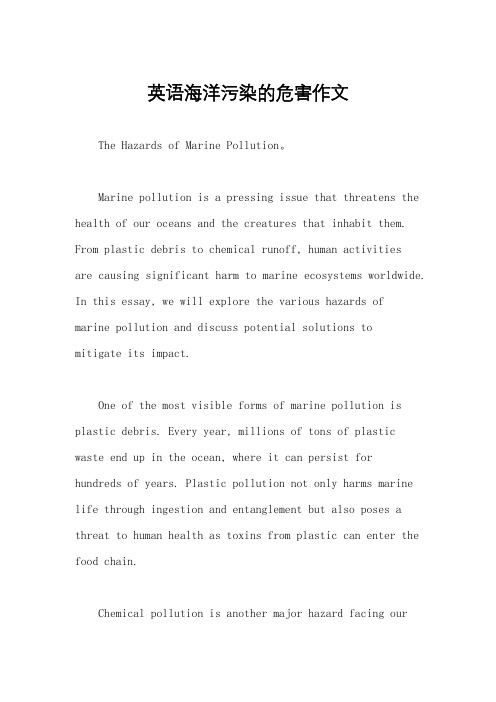
英语海洋污染的危害作文The Hazards of Marine Pollution。
Marine pollution is a pressing issue that threatens the health of our oceans and the creatures that inhabit them. From plastic debris to chemical runoff, human activitiesare causing significant harm to marine ecosystems worldwide. In this essay, we will explore the various hazards ofmarine pollution and discuss potential solutions tomitigate its impact.One of the most visible forms of marine pollution is plastic debris. Every year, millions of tons of plastic waste end up in the ocean, where it can persist for hundreds of years. Plastic pollution not only harms marine life through ingestion and entanglement but also poses a threat to human health as toxins from plastic can enter the food chain.Chemical pollution is another major hazard facing ouroceans. Agricultural runoff, industrial discharge, and oil spills introduce a wide range of toxic substances into marine environments. These pollutants can accumulate in the tissues of marine organisms, leading to harmful effects on reproduction, growth, and immune function. Moreover, chemical pollution can contaminate seafood consumed by humans, posing serious health risks.Furthermore, nutrient pollution, primarily from agricultural fertilizers and sewage discharge, can lead to harmful algal blooms. These blooms deplete oxygen levels in the water, creating dead zones where marine life cannot survive. In addition to causing mass die-offs of fish and other organisms, nutrient pollution can disrupt entire ecosystems, leading to long-term consequences for biodiversity and ecosystem services.Climate change exacerbates the impacts of marine pollution by altering ocean temperatures, acidity levels, and circulation patterns. Rising temperatures can increase the frequency and intensity of coral bleaching events, while ocean acidification threatens the survival of shell-forming organisms such as corals, mollusks, and plankton. Changes in ocean circulation can also affect thedistribution of pollutants, leading to unpredictable ecological effects.Despite the severity of the problem, there is hope for addressing marine pollution through collective action and innovative solutions. Governments can enact and enforce stricter regulations on waste disposal, chemical use, and fishing practices to reduce pollution at its source. Furthermore, investments in waste management infrastructure and public education campaigns can help raise awareness and promote responsible behavior among individuals and industries.Innovations in technology offer promising opportunities for tackling marine pollution. Biodegradable alternatives to single-use plastics, such as compostable packaging and plant-based polymers, can help reduce plastic waste in the ocean. Advanced filtration systems and treatment technologies can remove pollutants from wastewater beforeit is discharged into marine environments. Additionally,remote sensing and monitoring tools enable scientists to track pollution hotspots and assess the effectiveness of conservation efforts.International cooperation is essential for addressing marine pollution on a global scale. Through initiatives such as the United Nations Environment Programme (UNEP) and the International Maritime Organization (IMO), countries can collaborate to develop comprehensive strategies for protecting marine ecosystems and promoting sustainable use of ocean resources. By sharing knowledge, resources, and best practices, we can work together to safeguard the health and vitality of our oceans for future generations.In conclusion, marine pollution poses significant hazards to marine ecosystems, human health, and the global economy. Plastic debris, chemical runoff, nutrient pollution, and climate change threaten the health and vitality of our oceans, with far-reaching consequences for biodiversity and ecosystem services. However, by taking collective action, implementing innovative solutions, and promoting international cooperation, we can address theroot causes of marine pollution and ensure a sustainable future for our oceans.。
海洋的污染英语作文
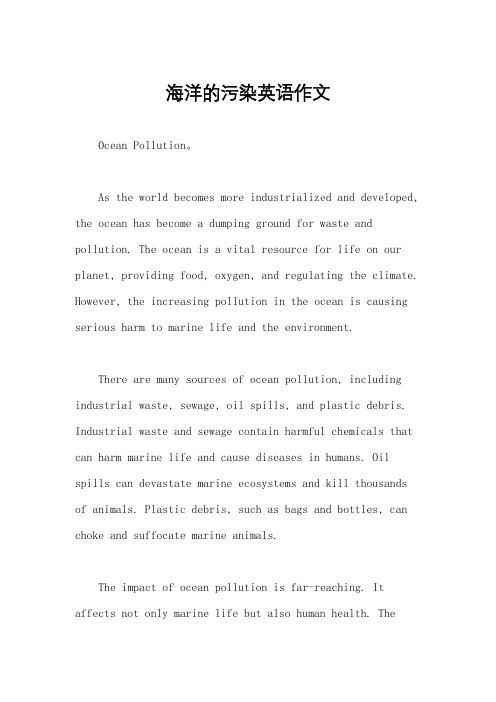
海洋的污染英语作文Ocean Pollution。
As the world becomes more industrialized and developed, the ocean has become a dumping ground for waste and pollution. The ocean is a vital resource for life on our planet, providing food, oxygen, and regulating the climate. However, the increasing pollution in the ocean is causing serious harm to marine life and the environment.There are many sources of ocean pollution, including industrial waste, sewage, oil spills, and plastic debris. Industrial waste and sewage contain harmful chemicals that can harm marine life and cause diseases in humans. Oil spills can devastate marine ecosystems and kill thousands of animals. Plastic debris, such as bags and bottles, can choke and suffocate marine animals.The impact of ocean pollution is far-reaching. It affects not only marine life but also human health. Thechemicals and toxins in the ocean can contaminate the fish and seafood we eat, leading to serious health problems. The plastic debris in the ocean can also end up in our food chain, as fish and other marine animals mistake it for food.To address the issue of ocean pollution, we need totake action on multiple fronts. Governments must regulate and enforce laws to prevent industrial waste and sewagefrom entering the ocean. Oil spills must be prevented through stricter regulations and better safety measures. Individuals can also make a difference by reducing theiruse of plastic and properly disposing of waste.In conclusion, ocean pollution is a serious problemthat requires immediate action. We must take steps toreduce pollution and protect the ocean for future generations. By working together, we can ensure that the ocean remains a vital resource for life on our planet.。
- 1、下载文档前请自行甄别文档内容的完整性,平台不提供额外的编辑、内容补充、找答案等附加服务。
- 2、"仅部分预览"的文档,不可在线预览部分如存在完整性等问题,可反馈申请退款(可完整预览的文档不适用该条件!)。
- 3、如文档侵犯您的权益,请联系客服反馈,我们会尽快为您处理(人工客服工作时间:9:00-18:30)。
This essay concentrates on five major causes of marine pollution, which are the discharge of domestic and industrial wastewater, waste oil, plastics, heavy metals and aquaculture. The proposed solution to this problem will be prevention and pollution treatment, and eventually, the former one proves to be more effective. Firstly, this essay will present and explain the major causes and effects of marine pollution. Then, different solutions will be suggested in the second part. The final part will evaluate the effectiveness of these solutions and show that prevention may be more successful.The first main cause of the marine pollution is the discharge of domestic and industrial wastewater. Since both the cities and industrial estates are crowded with lots of people, there is more sewage flowing into rivers and then into oceans. Therefore, the quality of seawater gets worse and oxygen content decreases rapidly. Without oxygen, fish living under the sea can not survive. Because of the nutrients in the sewage, seaweed may grow well firstly and eventually die when running out of food. So the wastewater will finally destroy ecological balance for the reason of the discharge of domestic and industrial wastewater.Then waste oil is another significant cause of marine pollution. After leaking from ships, or spilling in accidents, or flowing out of factories, waste oil enters oceans. The total amount of waste oil is surprisingly great. Then the waste oil floats on the water and drifts with winds for it is lighter than water. Several elements in the waste oil are harmful to the living of creatures, especially to the living of seabirds. The oil sticks to the wings of seabirds so they can not fly and die on the sea one after another. It is also poisonous for fish and sea plants. So it is obvious that waste oil may letmany creatures to run into danger of dying out.The third major cause of marine pollution is plastics. Plastics are the main solid pollutants and people treat the oceans like a giant dustbin to pour plastics in. Kusui and Noda’s research showed that in the seashore of Japan, if there are 100 waste items thrown by people, 73 items are plastics, and the plastic litter equals 53.8% of the total litter of wastes. In the neighbouring Russia, the statistics are 55 items and 23.4% respectively (Islam, 2004).[1] The plastics can block the propeller of ships, and may cause enormous accident. Plastics floating in the oceans can also cause lack of oxygen and have the similar effects, preventing respiration of creatures, as the sewage does. When the plastics break down in the oceans, they can be toxic to marine plants and animals. Therefore, plastics are not only harmful to ships sailing in the oceans and mankind, but also to other creatures living in the seas.Heavy metals are the fourth main cause of the environment problem. There are various sorts of heavy metals contained in water from factories. They go into the oceans through rivers or water run-off. Then they are eaten by fish and begin to accumulate in their bodies. When these fish are caught by us human beings, heavy metals enter our bodies and make us ill. Heavy metals can cause serious diseases.Aquaculture is the final major cause to marine pollution. People usually cultivate fish and other marine life for food. But the foods which they use to feed marine life consequently harm the marine environment where there are people live around. It is because these foods are organic matter and will become rotten in the oceans gradually. The quality of seawater is reduced by this kind of substance and the marine life livingin this ocean area and adjacent ocean area will die. Thus, aquaculture will cause harm to the quality of seawater of large areas of oceans.There are two main solutions to the marine pollution problem. Prevention comes out first. It is suggested that governments should perfect new intendance system of protecting the quality of water that we should make water completely clean before it is discharged to the oceans. It is also necessary to establish laws to keep the conduct of people and enterprises, and develop cooperation among different countries. The second main solution is pollution treatment, which contains setting up treatment plants and planting trees. In Kocasoy, Mutlu, and Alagöz’s study (2008), [2]these solutions can reduce the discharge of domestic and industrial wastewater as well as improve the quality of seawater. Since trees are able to make soil secure and hold back water from running off, they can be planted in the crowded cities and factories which cause marine pollution. Treatment plants are used to cleanse the seawater.Considering the advantages and disadvantages of the two solutions, prevention of marine pollution will be more effective to solve the problem. In one hand, prevention is the most essential theme of environmental management. The monitoring of water quality can be put into practice in advance to prevent damage to ocean environment. To improve attitudes of people and enterprises towards pollution will obviously be helpful and it is feasible to bringing these limits to maintain the marine environment in good condition. In the other hand, always firstly polluting the marine environment and then taking counter-measures as treatment is irresponsible behaviour. Although these measures can reduce pollution to some extent, the disastrousconsequences may have already existed, and marine pollution will continually come into being and never end. Consequently, prevention is much better in solving the pollution problem.This essay considers the main causes and effects of marine pollution. The five causes are the discharge of domestic and industrial wastewater, waste oil, plastics, heavy metals and aquaculture. They can destroy the ecological balance, endanger many creatures of dying out, harm ships, human beings and other creatures, cause serious diseases to mankind, and cause harm to the quality of seawater of large areas of oceans. The solutions are prevention and pollution treatment. The prevention of marine pollution is proved to be more effective than pollution treatment because it can basically solve this problem and maintain the marine environment in a good condition. In my opinion, it is a challenge for governments to take proper measures to prevent people continuing polluting behaviour. However, there is still a long way to go in the future.(word count = 1151 words)Reference[1] Islam, M. S. & Tanaka, M., (2004) Impacts of pollution on coastal and marine ecosystems including coastal and marine fisheries and approach for management: a review and synthesis. Marine Pollution Bulletin, 48(7-8), P.624-649[2] Kocasoy, G., Mutlu, H. İ., Alagöz B. A. Z., (2008) Prevention of marineenvironment pollution at the tourism regions by the application of a simple method for the domestic wastewater. Desalination, 226(1-3), P.21-37。
